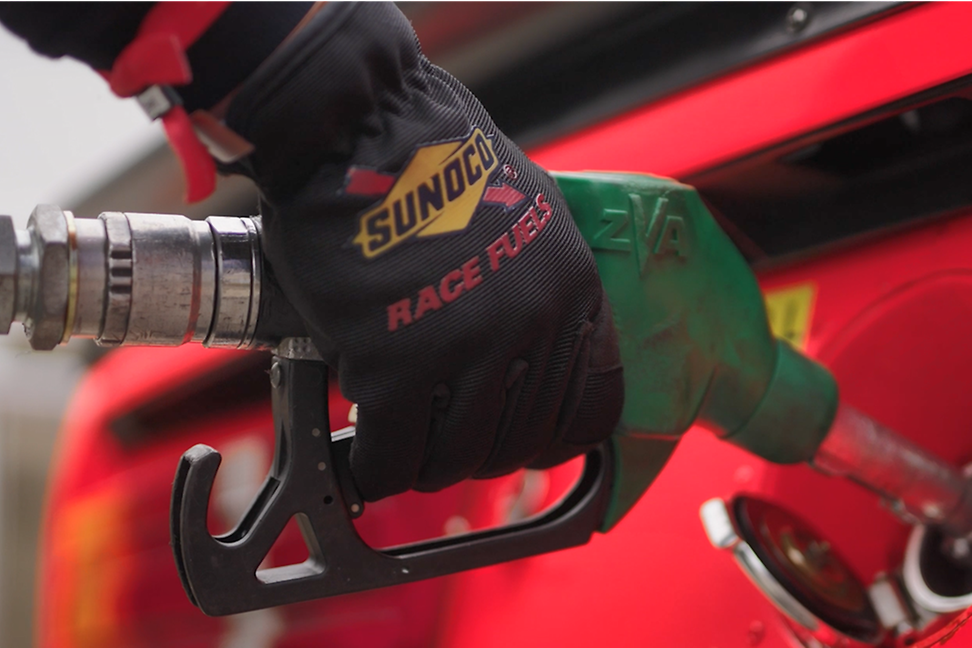The Goodwood Estate, in the heart of West Sussex, is an 11,000 acre estate, home to the Duke of Richmond for the last 300 years. Over the generations, the family has established many sporting pursuits on the estate including horse-riding, motorsport, cricket and golf.

The ninth Duke of Richmond founded the Goodwood Motor Circuit in 1948 and the British Automobile Racing Club held 71 race meetings there until 1966 when the Circuit closed. The Members’ Meeting was revived in 2014 for the Goodwood Road Racing Club. This year the 81st Members’ Meeting was celebrated over the weekend of 13th and 14th April, with 13 races taking place.
LGT Wealth Management partnered with the Members’ Meeting for the second year running with this year seeing the introduction of two races run purely on sustainable fuels; the all-Ford Mustang Ken Miles Cup and the Gordon Spice Trophy.
The partnership enabled the grid of 30 Mustangs participating in the Ken Miles Cup to race using sustainable fuels, supplied by Anglo American Oil Company. This exciting milestone forms part of Goodwood’s vision to champion the use of sustainable fuels and looks ahead to the 2024 Goodwood Revival where all races will be run using a fuel with a minimum of 70% sustainable components in accordance with the FIA’s current requirements.
The Brief spoke with Nigel Greensall, racing car driver and coach, Dan Garlick, Motorsport Director at Goodwood, Anders Hildebrand, former racing driver and Owner of Anglo American Oil Company, Phoebe Stone, Head of Sustainable Investing at LGT Wealth Management and Ben Snee, CEO of LGT Wealth Management to understand more about the importance of the partnership and the journey to sustainability in motorsports.
Nigel Greensall: ‘All of the drivers in historic and modern race cars are embracing the move to sustainable fuels. It is very exciting to be part of this development that we will all benefit from in our daily lives with our regular road cars.’
Nigel Greensall: ‘Having now done a number of races on sustainable fuels, I can confirm there is no difference for the driver either in performance or reliability of the race cars.’
Dan Garlick: ‘The core ethos of Goodwood has always been about sustainability and preserving and enhancing the estate for generations to come. We have been working for 18 months to introduce sustainable fuels and are really pleased to have run the Ken Miles Cup using it this year. We are very keen that motorsport is as sustainable as possible at Goodwood and are moving to sustainable fuel for all of our races from September this year.’

Anders Hildebrand: ‘Designing Sunoco sustainable racing fuels for classic racing engines is actually trickier than designing them for newer electronically controlled engines. This is due to the fact that new engines have ignition control systems that are easily mappable and sensors that measure detonation which obviously classic engines don’t have. This means that the Sunoco race fuel has to be “bullet proof” to ensure that it is a true drop-in solution. Saying that, with the variety of different engines, we opted to make not just one fuel, but four formulations to ensure there was a fuel for every type of engine configuration.
Anders Hildebrand: ‘There are different ways of making sustainable fuels in regard to where the sustainable components come from. The Sunoco fuels are made from Generation 2 ethanol which, through a refinery process, is turned into liquid hydrocarbons that save around 60-65% of GHG emissions and are classed as 100% sustainable. These sustainable hydrocarbons can then be mixed with higher octane components to boost octane levels and performance of the final blend as well as reintroducing Generation 2 ethanol into the blend to improve power.
To be classed as sustainable, the ethanol, which is the basis of the production of the sustainable hydrocarbons, is made from waste from food, forest or other sources to make sure that nothing is wasted.
The next step is carbon capture, which is something that Anglo American Oil Company is involved with but volumes are still very small and the process is, before being scaled up, very expensive.
The focus was on keeping the sustainable components over 70% whilst enabling us to provide the high octane Sunoco race fuels that classic engines need, and this is by far the trickiest part of making sustainable fuels. I’m pleased that we managed to deliver high octane fuels whilst maintaining 70% sustainability within the fuel. Another issue is that classic race cars were designed before bio-components found their way into standard fuels meaning that we needed to make sure that fuel systems did not corrode or fuel lines perish – this was achieved using Sunoco proprietary chemicals and additives.
For Goodwood Members’ Meeting, to meet all targets, we worked with engine builders and provided test fuels for their dynos to make sure the Ford Mustang race engines and the Group 1 Touring Car engines worked well. As even Mustang engines are slightly different, we ended up with a situation where engine builders favoured different versions of the Sunoco Sustainable fuels and therefore ended up with four different fuels to suit all “taste buds”. The four different fuels were: Sunoco FAS, which is an unleaded highly oxygenated 101 octane (RON) race fuel; Sunoco S70L with enhanced valve seat protection and zero oxygen at 102 octane; the Sunoco S70LE8 also features enhanced protection for the valves but is designed to give more power due to 2.6% of oxygen whilst octane was held at 102 octane; and finally the 103 octane Sunoco S70LE15 with a massive 5.2% oxygen to maximise power. All these fuels have a built-in additive package to protect the valve train and also to minimise the fuel’s effect on the fuel systems.’
Nigel Greensall: ‘The development of sustainable fuels in racing will help with the development in road cars too, which is really positive. I think it will feed through to other components in racing cars, such as tyres, brake materials and recycling parts along with making cars much more efficient both with fuel mileage and other wearing components. The speed of development in racing really drives this forward to the benefit of all.’
Phoebe Stone: ‘The financial industry can only do so much on its own, so creating these longstanding and meaningful partnerships with organisations like Goodwood is crucial if we want to achieve actual long- term and sustainable change.
LGT has made a pioneering commitment to be net zero by 2030 and Goodwood has made a similar commitment, going from one race being raced on sustainable fuels [at the 2023 Goodwood Revival] to 36 races in a twelve-month period is nothing short of extraordinary.’
Ben Snee concluded: “LGT is committed to establishing partnerships with organisations such as Goodwood that contribute towards a more sustainable future. Exploring opportunities such as the use of sustainable fuel in historic car racing demonstrates LGT and Goodwood’s shared belief that innovation and sustainability go hand in hand.’
Visit our dedicated sponsorship page to find out more about our partnership with Goodwood.
This communication is provided for information purposes only. The information presented herein provides a general update on market conditions and is not intended and should not be construed as an offer, invitation, solicitation or recommendation to buy or sell any specific investment or participate in any investment (or other) strategy. The subject of the communication is not a regulated investment. Past performance is not an indication of future performance and the value of investments and the income derived from them may fluctuate and you may not receive back the amount you originally invest. Although this document has been prepared on the basis of information we believe to be reliable, LGT Wealth Management UK LLP gives no representation or warranty in relation to the accuracy or completeness of the information presented herein. The information presented herein does not provide sufficient information on which to make an informed investment decision. No liability is accepted whatsoever by LGT Wealth Management UK LLP, employees and associated companies for any direct or consequential loss arising from this document.
LGT Wealth Management UK LLP is authorised and regulated by the Financial Conduct Authority in the United Kingdom.